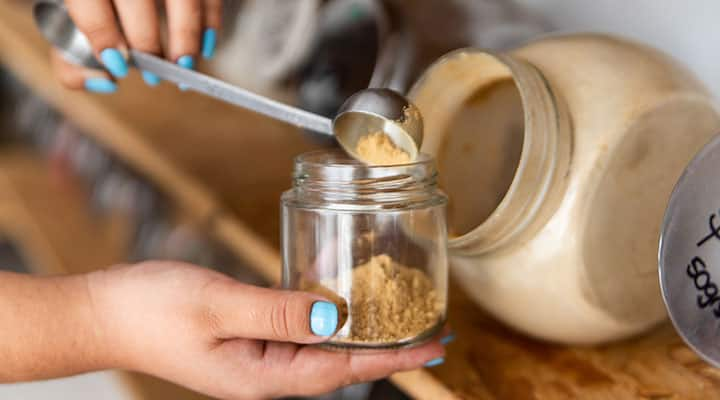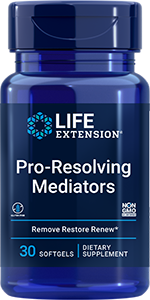
12 Health Benefits of Ginger
Published: September 2023
Ginger is a versatile spice that adds a punch of flavor to both sweet and savory foods. Besides its great taste, ginger provides numerous health benefits, thanks to its rich profile of bioactive compounds—most notably the gingerols responsible for ginger's characteristic spicy and pungent flavor.
Research has studied ginger's many beneficial effects, including:
- Healthy inflammatory response
- Immune system support
- Heart health
- Supporting already-healthy blood sugar
- Weight management
- Joint comfort
- Digestive health
- Liver health and more!
With all these health benefits, it's easy to see this spicy root is good for everyone, not just pregnant women. (Because yes, it also has a reputation for providing support those first few months!) And it comes in many forms, from crystalized ginger to ginger tea and ginger supplements.
What makes ginger so effective?
Ginger contains many bioactive compounds, including gingerols. Gingerols contribute to a lot of the potential health benefits attributed to ginger.
Another compound, shogaol, is a derivative of gingerol that forms when ginger is dried or cooked. Shogaol has a spicier taste than gingerol. It is responsible for the warming sensation you feel when consuming ginger-based products like ginger tea or ginger candy. Some research suggests that shogaol may be even more potent than gingerol in certain aspects of health.
12 ways ginger can enhance your health
Ginger has been used by humans for centuries, and many studies support its health benefits:
Healthy inflammatory response and anti-oxidative benefits:
Ginger's antioxidant activity helps fight free radicals and oxidative stress in your body. Ginger also promotes a healthy inflammatory response.Promotes immune health:
The bioactive phenolics in ginger, including gingerols, paradols and shogaols, also encourage immune health and support a healthy immune response. Their effect on healthy cell division helps support whole-body health.Helps support comfort after meals (especially for moms-to-be):
Ginger is well-known for its ability to soothe pregnant women in their first trimester; chewing ginger candy or sipping ginger tea is a rite of passage for many expectant mothers. It is often recommended for pregnancy-associated reactions to foods or smells and for stomachs sensitive to certain modes of travel or other triggers.Helps maintain already-healthy blood sugar:
Research suggests that ginger helps maintain healthy blood sugar and HbA1c levels.Heart health benefits:
Some studies suggest that ginger may help maintain already-healthy blood pressure and LDL cholesterol levels as well as triglycerides. Healthy blood pressure and cholesterol levels promote cardiovascular health.Male sexual support:
A different type of ginger, K. parviflora, has been used to promote male sexual health for years, and research results are impressive. Studies have shown this compound’s support for male sexual function, response and performance.Promotes joint comfort:
Clinical studies show that ginger supplementation can help inhibit inflammation to support joint health and support healthy C-reactive protein levels.Relieves menstrual discomfort:
Ginger is often cited as a way of relieving occasional pain associated with menstrual discomfort.Bloat relief:
Ginger is often used to relieve occasional digestive discomfort. Some research suggests that ginger can help relieve bloating by speeding up stomach emptying.Encourages liver health:
Studies suggest that ginger may stimulate antioxidant enzymes that help reduce oxidation and lipids in the liver, thus promoting liver health.May help improve iron absorption:
Studies suggest that ginger supplementation may help enhance iron absorption and help relieve the gastrointestinal effects of iron supplements.Prebiotic properties:
Prebiotics are non-digestible compounds found in certain foods that promote the growth and activity of beneficial bacteria in the gut. Studies show that ginger may act as a prebiotic to support the gut microbiome.
Explore Our Best Digestive Health Supplements
What is the healthiest way to consume ginger?
Ginger can be consumed in a variety of ways depending on your personal preference, including raw, pickled, crystallized, or as ginger powder. There's not really one "healthiest" way to ingest ginger. However, raw ginger and ginger supplements that are standardized to bioactives, like gingerols, may offer the most bioactive compounds, which contribute to the health benefits of ginger.
Advanced ginger supplements combine ginger with other beneficial nutrients, such as curcumin, to help promote a healthy inflammatory response, cardiovascular health, brain health and immune response.
How much ginger should you have?
Ginger extracts and ginger powders have been used in clinical studies at a variety of doses, often between 500 mg and 3 g a day. Some studies suggest that having more than about 5 g daily may cause gastrointestinal discomfort.
For reference, 1 teaspoon of raw ginger root is about 2 grams, so if you are consuming raw ginger root, then up to about 2 teaspoons per day is reasonable and safe for most healthy individuals.
Is it healthy to eat ginger root every day?
Ginger root is healthy and can be eaten daily. However, as with many foods, individual tolerance may vary, especially to large quantities. Speak with a healthcare professional before adding any nutrient, including ginger root, to your diet in large quantities or in supplement form.
How to add fresh ginger into your diet
Fresh ginger can be consumed in a variety of ways. One popular use is ginger tea. Ginger tea is easy to make: Simply slice off the dry ends of fresh ginger, carefully peel it, and slice a few pieces into a cup or mug followed by boiling water. Let the ginger tea steep for about 10 minutes. To save time, you can also purchase pre-made ginger tea bags in most grocery stores. Ginger also adds a warm spice to turmeric milk.
Fresh ginger is also used in cooking to flavor stir-fries, soups and curries. Ginger can also be incorporated into immune shots.
Fresh ginger is firm and fibrous. It can be sliced, grated, or minced depending on your recipe needs.
Other forms of ginger
Ground ginger is a convenient alternative that can be used in cooking and baking in both meat and plant-based dishes. Ground ginger has a longer shelf life than fresh ginger and can be used in recipes without the need for preparation or peeling. While ginger powder is often associated with savory dishes, it can also be used in sweet applications, such as gingerbread and homemade pumpkin spice blends.
Another way to enjoy ginger is pickled. Pickled ginger is commonly served with sushi and sashimi as a condiment.
Crystallized ginger is ginger that has been candied in a sugar syrup to make chewy pieces. You can enjoy it as a snack or add to recipes such as trail mix or granola. Crystalized ginger snacks are popular among pregnant women to help support them during the first trimester.
Concentrated liquid doses of ginger extract are offered at some health food stores and smoothie shops. Note that ginger is very pungent, so individual tolerance may vary.
Are you getting the nutrients you need to support a healthy inflammatory response? Get a personal recommendation with Life Extension’s Health Needs Quiz.
References
- Anh NH, et al. "Ginger on Human Health: A Comprehensive Systematic Review of 109 Randomized Controlled Trials." Nutrients. January 2020. https://www.ncbi.nlm.nih.gov/pmc/articles/PMC7019938/
- Crichton M, et al. "Orally consumed ginger and human health: an umbrella review." Am J Clin Nutr. June 2022. https://www.ncbi.nlm.nih.gov/pmc/articles/PMC9170469/
- Hasani H, et al. "Does ginger supplementation lower blood pressure? A systematic review and meta-analysis of clinical trials." Phytother Res. June 2019. https://pubmed.ncbi.nlm.nih.gov/30972845/
- Maharlouei N, et al. "The effects of ginger intake on weight loss and metabolic profiles among overweight and obese subjects: A systematic review and meta-analysis of randomized controlled trials." Crit Rev Food Sci Nutr. 2019. https://pubmed.ncbi.nlm.nih.gov/29393665/
- Mathieu S, et al. "A Meta-Analysis of the Impact of Nutritional Supplementation on Osteoarthritis Symptoms." Nutrients. April 2022. https://www.ncbi.nlm.nih.gov/pmc/articles/PMC9025331/
- Ooi SL, et al. "Polyphenol-Rich Ginger (Zingiber officinale) for Iron Deficiency Anaemia and Other Clinical Entities Associated with Altered Iron Metabolism." Molecules. September 2022. https://www.ncbi.nlm.nih.gov/pmc/articles/PMC9573525/
- Samadi M, et al. "A systematic review and meta-analysis of preclinical and clinical studies on the efficacy of ginger for the treatment of fatty liver disease." Phytother Res. March 2022. https://pubmed.ncbi.nlm.nih.gov/35106852/
- Stein RA, et al. "Kaempferia parviflora ethanol extract improves self-assessed sexual health in men: a pilot study." J Integr Med. July 2018. https://pubmed.ncbi.nlm.nih.gov/29880257/
- Wang J, et al. "Beneficial effects of ginger on prevention of obesity through modulation of gut microbiota in mice." Eur J Nutr. March 2020. https://pubmed.ncbi.nlm.nih.gov/30859364/
- Wannanon P, et al. "Efficacy Assessment of Kaempferia parviflora for the Management of Erectile Dysfunction." Online J Biol Sci. December 2012. https://thescipub.com/pdf/ojbsci.2012.149.155.pdf
- Zheng J, et al. "Spices for Prevention and Treatment of Cancers." Nutrients. August 2016. https://www.ncbi.nlm.nih.gov/pmc/articles/PMC4997408/
Like what you read?
Please subscribe to get email updates on this blog.










